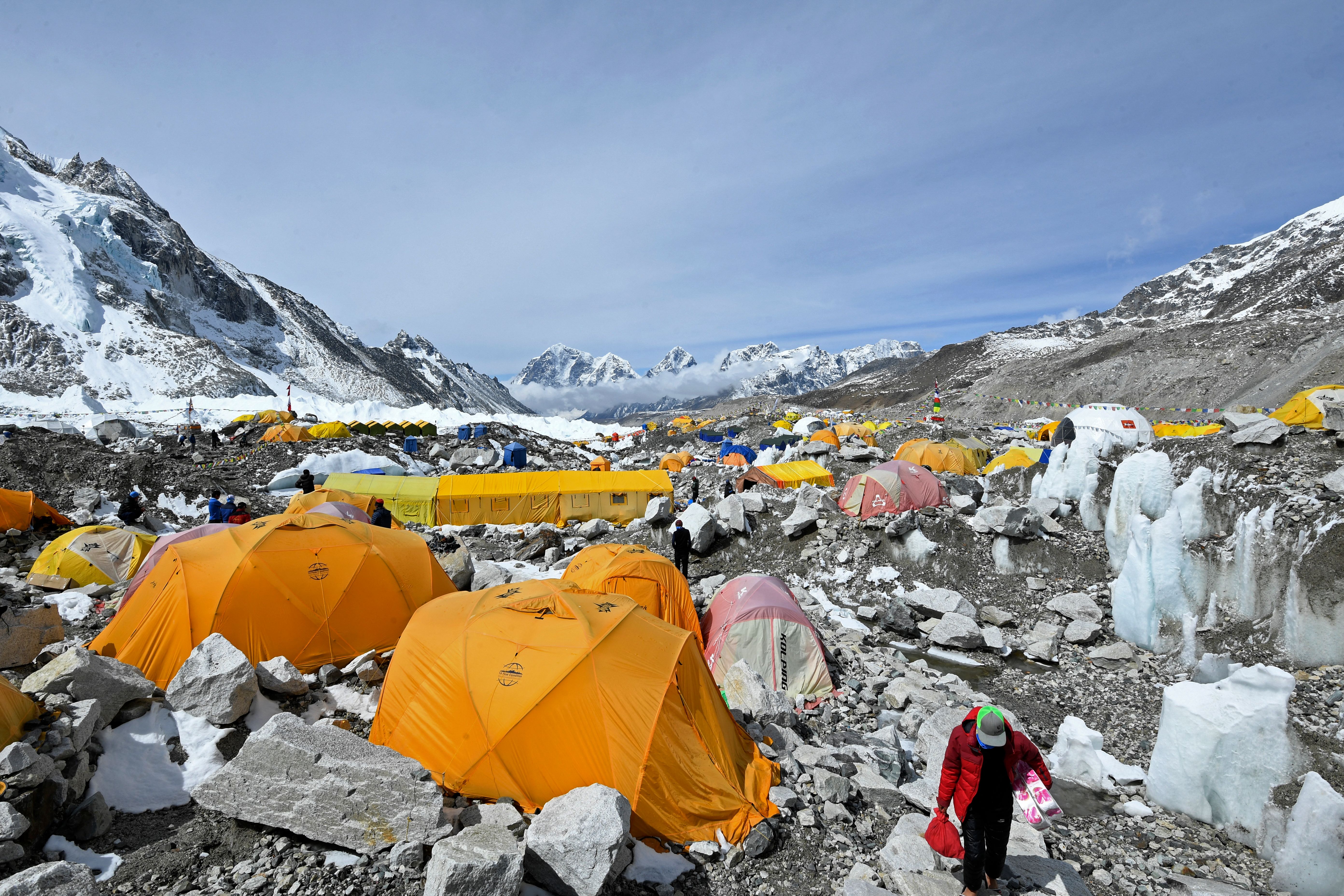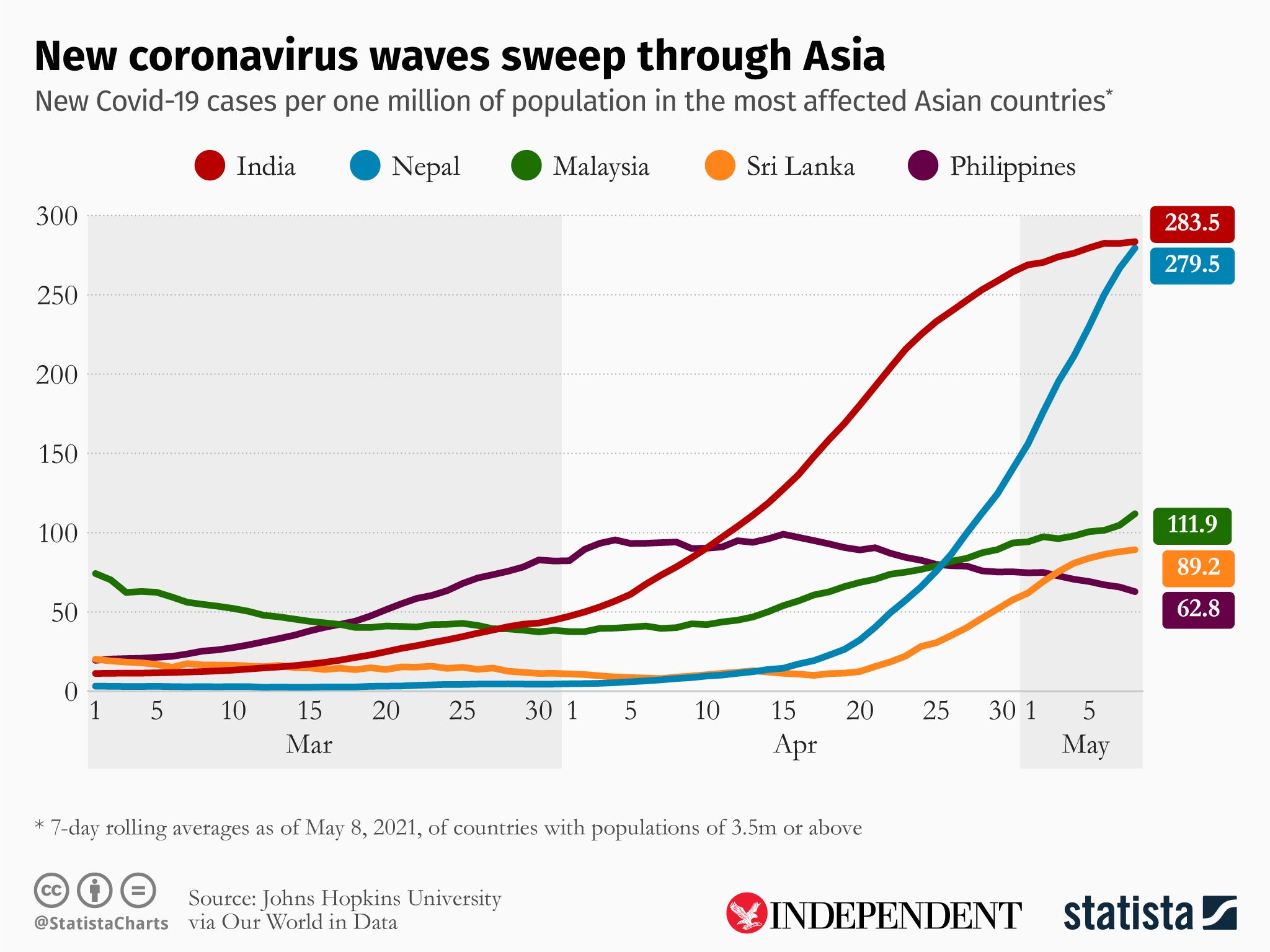Everest authorities tell climbers to bring back empty oxygen cylinders amid Nepal’s Covid shortage
Nepal is battling massive oxygen crisis across its hospitals

Your support helps us to tell the story
From reproductive rights to climate change to Big Tech, The Independent is on the ground when the story is developing. Whether it's investigating the financials of Elon Musk's pro-Trump PAC or producing our latest documentary, 'The A Word', which shines a light on the American women fighting for reproductive rights, we know how important it is to parse out the facts from the messaging.
At such a critical moment in US history, we need reporters on the ground. Your donation allows us to keep sending journalists to speak to both sides of the story.
The Independent is trusted by Americans across the entire political spectrum. And unlike many other quality news outlets, we choose not to lock Americans out of our reporting and analysis with paywalls. We believe quality journalism should be available to everyone, paid for by those who can afford it.
Your support makes all the difference.In a desperate plea to Everest climbers, the Nepal Mountaineering Association has asked them to bring back their empty oxygen canisters instead of abandoning them, amidst depleting oxygen supply in the country battling coronavirus.
Climbers and their sherpas were estimated to have carried over 3500 oxygen bottles with them this season. In a bid to meet the oxygen supply, the Nepal Mountaineering Association officials have now turned towards climbers and requested them not to abandon their oxygen canisters on the mountain.
Kul Bahadur Gurung, a senior official with the Nepal Mountaineering Association told the media: “These bottles often get buried in avalanches or are abandoned on the mountain slopes at the end of the expedition. We appeal to climbers and sherpas to bring back their empty bottles wherever possible as they can be refilled and used for the treatment of the coronavirus patients who are in dire needs.”
This season, Nepal issued more than 700 permits for 16 Himalayan peaks for the April-May climbing season. The government was desperate to get the mountaineering industry and tourism up and running. At least 408 permits were issued to climbers for Mount Everest.
On Sunday, Nepal reported a daily increase of 8,777 infections which, Reuters reported, is 30 times the number recorded on April 9. The total caseload stands at 394,667 and 3,720 deaths, according to government data. Nepal’s recorded per capita Covid-19 infections have almost caught up with India’s as of Saturday.
Many private and community hospitals in Kathmandu have been battling a shortage of oxygen and are unable to take on more patients. Samir Kumar Adhikari, a health ministry official told Reuters: “We need about 25,000 oxygen cylinders immediately to save people from dying. This is our urgent need.” He added: “We also need oxygen plants, compressors and ICU beds urgently.”

Meanwhile, Nepal has asked China to send 20,000 cylinders, some of which will be airlifted to meet urgent needs, another official told the media. Health and Population Minister Hridayesh Tripathi said: “China has pledged to provide oxygen cylinders, ventilators and other medical supplies.”
On Mount Everest, China is also setting up a “separation line” to avoid possible Covid-19 infections by climbers. Several reports indicated a Covid-19 outbreak at the base camp since many climbers were taken to Kathmandu hospitals with Covid symptoms.
In the hospitals, patients are sleeping on the floor and corridors given the lack of beds, Dr Prakash Thapa, a doctor at the Bheri hospital in Nepalgunj, in southwest Nepal said. “We are somehow managing so far but it will be difficult to take any more patients.”
According to ActionAid Nepal, Nepal has only 1,600 intensive care beds and fewer than 600 ventilators for its population of 30 million with just 0.7 doctors per 100,000 people.
There are fears that Nepal might mimic India’s Covid trajectory. As per the International Federation of Red Cross and Red Crescent Societies (IFRC), last weekend at least 44 per cent of Nepal’s Covid tests came back positive.
Nepal’s Red Cross chairperson, Dr Netra Prasad Timsina told CNN: “What is happening in India right now is a horrifying preview of Nepal’s future if we cannot contain this latest Covid surge that is claiming more lives by the minute.”
Infographic provided by Statista
Join our commenting forum
Join thought-provoking conversations, follow other Independent readers and see their replies
Comments